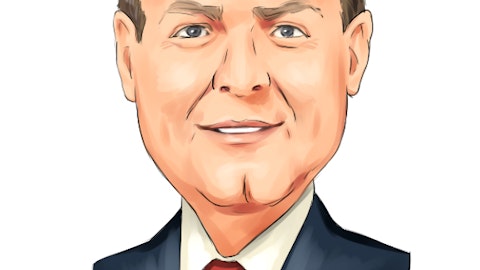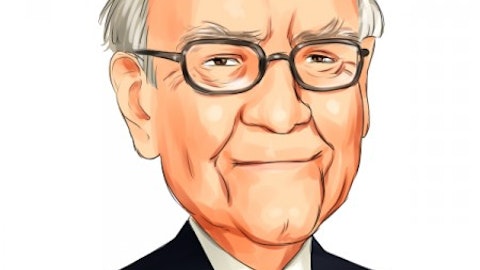According to statistics from Hedge Fund Research, the average hedge fund lost 2.76% in January, compared to a decline of approximately 5% for the S&P 500 benchmark, so hedge funds did outperform the broader market during the challenging month. And while several extremely successful hedge fund managers are doing very poorly thus far in 2016, investors should remember that investing is a marathon, not a sprint. There is a camp of smart money investors that has been able to deliver spectacular performance on a consistent basis, while others have had both ups and downs over the years. Even so, monitoring what hedge fund managers are doing might enable individual investors to think outside the box and identify new high-potential investment opportunities. For that reason, the following article will discuss three filings that were recently submitted with the SEC by several widely-known investment vehicles.
At Insider Monkey, we track around 730 hedge funds and institutional investors. Through extensive backtests, we have determined that imitating some of the stocks that these investors are collectively bullish on can help retail investors generate double digits of alpha per year. The key is to focus on the small-cap picks of these funds, which are usually less followed by the broader market and allow for larger price inefficiencies (see more details about our small-cap strategy).
According to a Form 4 filing, Cascade Investment LLC, an asset management firm owned by billionaire Bill Gates, bought 539.262 shares of AutoNation Inc. (NYSE:AN) on Friday at prices ranging from $45.48 to $46.85 per share, lifting its overall position to 17.66 million shares. Cascade bought an additional 273,951 shares a day earlier, as revealed by a separate Form 4 filing. A 13D, also recently released, reveals that the Bill & Melinda Gates Foundation Trust owns an additional 1.90 million shares of the automotive retailer, so the two entities managed by Michael Larson aggregately own 19.56 million shares of the company, which account for 17.7% of its outstanding common stock.
AutoNation has seen its shares plummet by more than 20% since the beginning of the year, partly owing to worries about the Fed’s tightening monetary policy and a potential decline in auto sales in the upcoming years. The company’s new and used vehicle margins dropped by $217 per vehicle on a combined basis in the fourth quarter, presumably because of discounts from manufacturers to boost sales. At the same time, AutoNation Inc. (NYSE:AN)’s new vehicle inventories on a same-store basis grew by 13% year-over-year due to a 49% increase in Premium Luxury inventories. U.S auto sales reached a record of 17.47 million vehicles last year, primarily due to lower gasoline prices and robust economic growth. Even though many believe that auto sales might have peaked already, AutoNation’s management anticipates that the auto industry will exceed 17 million in new vehicle unit sales this year. Meanwhile,AutoNation shares trade at a cheap forward P/E multiple of 9.94, well below the 16.70 average for the consumer discretionary industry. James Dondero’s Highland Capital Management reported owning 106,546 shares of AutoNation Inc. (NYSE:AN) through its 13F filing for the fourth quarter.
Follow Michael Larson's Bill & Melinda Gates Foundation Trust
The second page of this article discusses the two separate filings submitted by billionaire Warren Buffett and a widely-known healthcare-focused hedge fund.
As revealed by a Form 4 filing, Warren Buffett’s holding company, Berkshire Hathaway, bought 486,804 shares of Phillips 66 (NYSE:PSX) from Friday through yesterday, at prices varying from $73.31 to $79.20 per share. After the recent purchases, Berkshire Hathaway holds an ownership stake of 74.47 million shares of the oil refiner, constituting 13.96% of its outstanding common stock. The shares of the manufacturing and logistics company are down by 7% since the beginning of 2016, but are up by 1% over the past 12 months.
The company operates through four business segments, which include midstream, chemicals, refining, and marketing and specialties. There are several key nuances about Phillips 66 that investors might find attractive, which could also explain Buffett’s bullishness. First of all, Phillips 66 (NYSE:PSX) has a strong balance sheet, as the company’s cash and cash equivalents equal $3.1 billion while its debt amounts to $8.9 billion. Hence, the net-debt-to-capital ratio of only 20% is probably among the key reasons the billionaire investor keeps buying more shares of Phillips 66. Second of all, the company’s operating cash flows generated from its refining and marketing and specialties operations are very robust despite high reliance on refining and marketing margins. For instance, the company’s fourth-quarter earnings were severely impacted by lower realized margins, which were in turn affected by a decline in global market cracks. Thirdly, Phillips 66 pays out an annualized dividend of $2.24 per share, thus offering an attractive current dividend yield of 2.97%. Phillips 66 has a forward P/E multiple of 9.74, which is slightly higher than the average of 9.1 for the oil and gas refining and marketing industry. Iridian Asset Management, founded by David Cohen and Harold Levy, cut its position in Phillips 66 (NYSE:PSX) by nearly 389,000 shares during the fourth quarter, to 4.83 million shares.
Follow Warren Buffett's Berkshire Hathaway
In a Schedule 13D filing, Baker Bros. Advisors, managed by Julian Baker and Felix Baker, reported owning 105.20 million ordinary shares of Beigene Ltd (ADR) (NASDAQ:BGNE), which make up 24.6% of the company’s outstanding common stock. Earlier this week, the healthcare company that develops cancer therapies completed its initial public offering (IPO) of 7.59 million American Depositary Shares (ADSs), which were sold to the public at an IPO price of $24.00 per ADS. It should be noted that each ADS represents 13 ordinary shares of Beigene. Furthermore, Baker Bros. Advisors’ employees Michael Goller and Rajeev Krishana, have been on the company’s Board of Directors since April 2015 and October 2015, respectively. As already mentioned, the company focuses on developing innovative, molecularly targeted immuno-oncology drugs for the treatment of cancer, and is currently working on four clinical-stage drug candidates that are believed to have the potential to be best-in-class or first-in-class. For instance, the company’s BGB-3111 drug candidate, a potent and highly selective small molecule BTK inhibitor for the treatment of lymphomas, has demonstrated higher exposure than the only FDA-approved BTK inhibitor, called ibrutinib. Meanwhile, the stock spiked above levels of $35 after the IPO, but has been gradually declining since the beginning of the week. Even so, the stock is currently trading about by 8% from its IPO price.
Follow Julian Baker And Felix Baker's Baker Bros. Advisors
Disclosure: None





